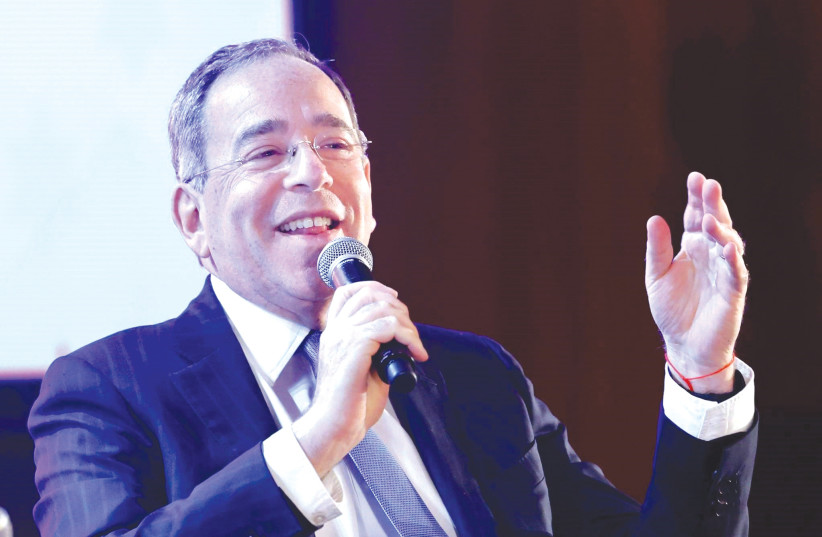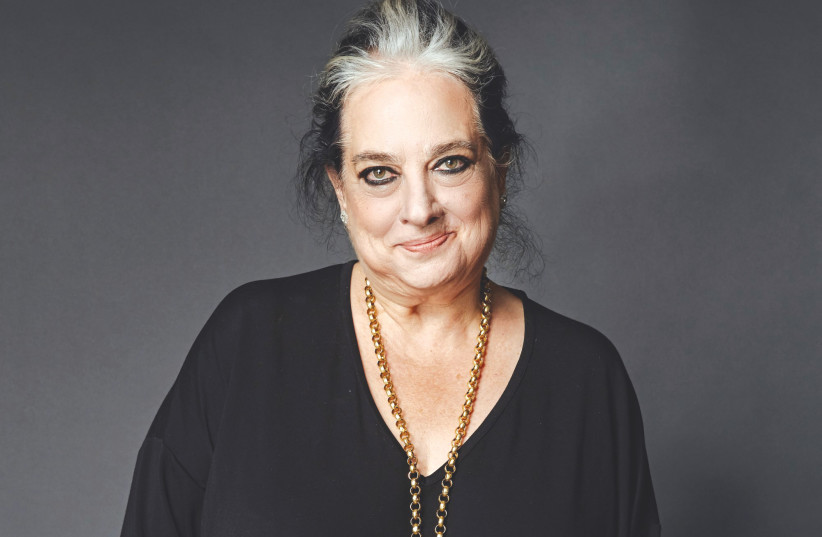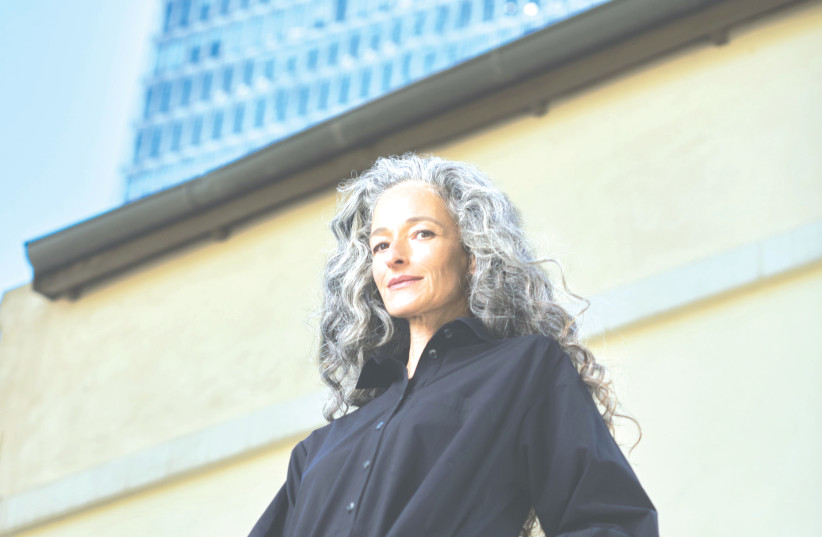The timing was purely coincidental but it could not have been more appropriate, given the state of affairs in Israel today. International human rights activist Irwin Cotler, who in 2018 was the recipient of an Honorary Doctorate from Tel Aviv University which recognized him as a “champion of justice”, was the subject of a superb documentary First to Stand: The Cases and Causes of Irwin Cotler.
A former Canadian Minister of Justice and Attorney General believes that freedom and democracy are synonymous and that loss of either is a violation of human rights. Not only was there a film about him but following the screening, Cotler and his equally eloquent daughter Michal, who is a former MK, answered questions put to them by Times of Israel editor David Horovitz and members of the audience at the Jerusalem Cinematheque.
Cotler’s father taught him that the pursuit of justice was equal to all other commandments combined. His mother said that in order to pursue justice, you have to feel injustice.
Some of Cotler’s remarks both in the film and in person include:
• There is a resurgent global authoritarianism and a retreat of democracy.

• One person is able to confront evil and transform history.
• Every political prisoner who was released was because of his wife’s advocacy on his behalf.
• Women have emerged as transformative leaders in global human rights movements.
• With regard to freedom of the press: The media draws attention to the pain and plight of political prisoners.
• The demonization of the other is a violation of human rights.
• Violators of human rights have been put in charge of United Nations human rights organizations.
• What makes genocide unspeakable is that so many genocides were preventable but the world was indifferent.
■ Cotler credits the Anatoly Sharansky case with bringing about change in Russia’s attitudes to human rights and with providing a model for the release of political prisoners in other countries.
Several years after Sharansky’s release from prison, Cotler met with Mikhail Gorbachev, who as president of Russia had authorized and signed for Sharansky’s release. When Cotler asked Gorbachev about his role in granting Sharansky his freedom, Gorbachev replied that he had never heard of Sharansky in Russia but when he traveled abroad, he heard Sharansky’s name wherever he went and was subjected to demonstrations on Sharansky’s behalf. After he became president, Gorbachev asked to see Sharansky’s file and realized that it was in Russia’s best interests to release him.
Speaking in Jerusalem, Cotler emphasized the importance that securing the release of political prisoners is in the best interests of the countries that hold them captive.
Among the cases with which he is currently dealing, is that of Russian political prisoner and human rights activist Vladimir Kara-Murza, who dared to criticize the Kremlin following Russia’s invasion of Ukraine. Kara-Murza has been charged with treason and is languishing in prison. His wife Evgenia is using all the means at her disposal to secure his release. Cotler sees her as a latter-day Avital Sharansky.
Cotler is also involved in trying to cancel a 10-year travel ban on Saudi dissident and human rights defender Raif Badawi, who in March last year was released from prison after serving a 10-year sentence but is still under a 10-year travel ban, which prevents him from being reunited with his wife Einsat Haidar and their children who are living in Canada. Einsat Haidar is also a human rights activist who tirelessly campaigned for her husband’s freedom and has joined forces with Iranian women who are campaigning for freedom of choice in their life-styles.
There was, of course, the inevitable question of how Cotler, who was among the legal experts invited to the President’s Residence by President Isaac Herzog, views Israel’s judicial reform. Acknowledging that reforms are needed in every democracy, Cotler expressed that the package of reforms as they stand now undermines the independence of the judiciary. “What we need is a process to arrive at substance – a people’s process that will end with the people’s constitution for the State of Israel.”
■ THE FIRST anniversary of the passing of Esther Pollard was marked this week. Although her husband, Jonathan Pollard, was convicted on charges of espionage, it can also be said that he was a political prisoner in view of the extraordinarily long period of his incarceration in comparison to the sentences of people who had committed similar crimes but had spied for an enemy of the United States, whereas Pollard had spied for a friend and ally.
Esther Pollard devoted half of her life campaigning for her husband’s release. Born in Canada, she made her home in Israel while still a young woman. She first met Jonathan Pollard when they were children in a youth camp and years later, after learning of the conditions under which he was imprisoned, renewed her connection with him. They married in 1993. As much as she wanted to be a mother, most prisons in America do not allow conjugal visits, which meant that she was denied the basic right of every woman.
Following her husband’s release after 30 years behind bars, he, like Raif Badawi, was grounded by a travel ban, which in Pollard’s case was for five years. Esther had been battling cancer for a long time and she was already very ill when they finally arrived in Israel, after spending five years together in New York.
Following her death, Jonathan Pollard decided to memorialize her in perpetuity by establishing a Jewish educational center in her name, which he called the Center for Esther’s Children (CEC). The CEC provides Jewish education for youngsters from early childhood to Bar mitzvah age to equip them with a sense of Jewish identity, regardless of whether or not they follow a religious path.
To enable the CEC to keep on promoting this vision, he recently mounted a fund-raising campaign, which to date has received in excess of NIS 2 million from some 6,000 donors. Many people can’t afford to give large amounts but in the spirit of the old British proverb that states that if you look after the pennies, the pounds will look after themselves, numerous people giving a little will amount to a lot.

■ IS IT judicial reform or an upheaval? This is the question that will be posed and answered by retired Supreme Court Justice Dorit Beinisch when she addresses members of the Commercial and Industrial Club at the Tel Aviv Hilton, on Friday, March 3. Beinisch was the first female president of the Supreme Court.
■ SPEAKING AT a Yediot Aharonot and Ynet conference on Tuesday after the passing of the first reading of the judicial reform act, President Isaac Herzog said that it was a difficult morning without any feeling of celebration.
■ SEVERAL AMBASSADORS who served in Israel as junior diplomats have returned as heads of mission of their respective embassies. There are even some who first arrived in an ambassadorial capacity and returned to that role. The revolving door syndrome applies not only to diplomats but also to journalists.
Ethan Bronner, who was the Jerusalem-based Middle East correspondent for the Boston Globe, later accepted a position with the New York Times (NYT). After several years as both an editor and a correspondent, he returned to Jerusalem in 2008, spending four years as the NYT’s bureau chief.
During this period, one of his two sons served in the Israel Defense Forces.
After 17 years with the NYT, Bronner transferred to Bloomberg News in 2015, serving as a senior editor. Last November, he was named as Bloomberg’s bureau chief in Israel and is due to return shortly.
It’s not really surprising that he opts to spend so much time in Israel. His wife Naomi happens to be an Israeli.
■ IT MAY be remembered that three months ago, Israel’s ambassador to France, Yael German, resigned on the grounds that she could not in all honesty represent the new government. The upshot of that was that during his recent visit to France, Prime Minister Benjamin Netanyahu did not want Germany to meet him at the airport or anywhere else, saying that she did not represent Israel.
In an interview with Gili Cohen on KAN 11, on Sunday, German said that the judicial reform as it presently stands negates the Declaration of Independence. She suggested that all other Israeli ambassadors follow her example and resign.
■ ISRAEL’S FORMER ambassador to the United Kingdom, Mark Regev, who currently chairs the Abba Eban Institute for Diplomacy and Foreign Relations at Reichman University and also writes a weekly column in The Jerusalem Post, will be the guest speaker today, Wednesday, at the Jerusalem Anglo Women’s Rosh Chodesh Club, which meets on a monthly basis at the beginning of every Hebrew calendar month.
The club is the initiative of two immigrants from Melbourne, Australia: Shirley Zauer and Rebecca Goldsmith. It was, therefore, on the cards that Regev, who also comes from Melbourne, would be invited to speak at one of the monthly meetings. His topic is “Lessons Learned from Four Years as Israel’s Ambassador to the UK.”
In the pipeline for the next three months, albeit subject to change, are Rabbi Professor Daniel Sinclair who on March 23, will speak on “The Interface between Halacha and Israeli Law;” Momentum founder Lori Palatnik, who on April 23, regardless of her official topic, will talk of the importance of giving women a sense of their Jewish identity and sisterhood; and Professor Gerald Steinberg, who on May 21, will discuss “Strategies for Defeating Apartheid, Demonization and the New Antisemitism.”
All meetings are held at Shimon Hatzaddik Synagogue, 4 Ben Baba Street, San Simon, Jerusalem. The cost is NIS 50, which includes a light lunch.
■ IT’S AN era of not being able to see the forest for the trees. In Israel, we see that the proponents of the judicial reform ignore both the mass protest demonstrations and the warnings by leading world figures that Israel may suffer economically and politically as a result. Author, journalist and social activist Eliezer Yaari, who has a weekly commentary on Reshet Bet, last Friday recalled that when he was a senior editor at the now defunct Israel Broadcasting Authority, he went to the Knesset just ahead of the 50th anniversary of the State to witness the endorsement of the Declaration of Independence by Prime Minister Benjamin Netanyahu, who was then prime minister and Ehud Barak, who was the leader of the opposition. At that time, said Yaari, Netanyahu affirmed all that was stated in the Declaration of Independence. Now it’s a different story.
What Yaari did not say was that 25 years ago, Netanyahu was still his father’s son and much of what he did was to find favor in his father’s eyes. Such is frequently the desire of a middle child who somehow feels that the first child received most of the love and attention and whatever was left was lavished on the youngest child. But from being his father’s son, Netanyahu became his son’s father and Yair Netanyahu’s social media blasts have not exactly served the prime minister’s interests.
■ PRIME MINISTER Benjamin Netanyahu is not alone in facing strong opposition. Poor King Charles III, just under three months away from his coronation, must endure the cruel jibes of the anti-monarchists, after waiting for so long to inherit the crown. The British apparently don’t learn. After it dawned on them that Brexit was not such a good idea after all, they now want to do away with one of the nation’s big money-makers.
It is almost impossible to estimate how much money Britain has made from the sale of souvenirs related to the Royal Family or from tourism to Royal Family estates. Although the Royal Family may cost the British taxpayers a pretty penny, this is offset not only by income derived through the Royal Family but also by the working royals, who grace so many events and whose presence guarantees a large attendance.
■ WORDS ARE important, both when actually uttered, when reported and when translated. When addressing the Conference of Presidents of Major American Jewish Organizations that convened in Jerusalem this week, US Ambassador Tom Nides sought to clarify a report that he had asked Prime Minister Benjamin Netanyahu to step on the brakes with regard to judicial reform. The report, widely published in the Israeli media and abroad, derived from a CNN podcast he had made with David Axelrod, who had been the chief strategist in Barack Obama’s presidential campaign.

Declaring that he didn’t know that so many people listened to the CNN podcast, Nides said that he had not suggested that Netanyahu step on the brakes, What he had suggested was that he should pump the brakes. There is definitely a difference. But even if he had used the misreported word, it must be obvious to anyone who has come in contact with Nides or who follows him on Twitter, that he is a warm, friendly individual, who describes himself as a cultural Reform Jew who loves Israel and its people.
It’s a Jewish characteristic to make suggestions to relatives and friends about how they should behave and what they should do. There are umpteen anecdotes about that trait, just as there are many debates about how much say Diaspora Jews should have about Israel’s internal and external policies.
For goodness sake, if we want their money and we want them to lobby on our behalf in international forums, they surely have a right to a place at the table. That also goes for representatives of the US, who are so frequently hailed as our greatest allies.
■ IN JEWISH tradition, the premature announcement of someone’s death is an omen for a very long life. That was certainly the case in 2000 when Knesset Speaker Avraham Burg became the victim of a practical joke and announced the passing of long-term MK and former Education Minister Amnon Rubinstein. Burg duly apologized and Rubinstein, a professor of law and an internationally respected legal authority, whose political career spanned from 1977 to 2002, is still going strong at age 91.
This week the Knesset heard a similar peace of fake news about former Labor MK, deputy mayor of Tel Aviv and peace activist Yael Dayan, who coincidentally celebrated her 84th birthday on February 12. Dayan, who for the past 20 years has suffered from a severe respiratory illness, is still alive and breathing, she told several media outlets after she had been eulogized by Labor MKs Gilad Kariv and Naama Lazimi, who each apologized and wished her a long life.

Longevity actually runs in her family. Her mother, Ruth Dayan, died two years ago, a month prior to her 104th birthday. Her mother’s sister Reuma Weizman is 97 and Dayan’s maternal grandmother Rachel Schwartz also lived to a ripe old age.
■ PESSIMISTS WHO worried in the midst of COVID that life in Israel would never return to what it was, have been proved wrong. Social life has returned: music, song and dance festivals are playing to full houses; theaters have reopened; Ben Gurion International Airport is packed with incoming and outgoing passengers; marketplaces are crowded, as are restaurants and coffee shops; and people are as usual complaining about the government and the cost of living. The only visible leftover from the pandemic is that some people are still wearing masks.
Coming up by way of revitalized events is Kornit Fashion Week FACTLV, which will be held at the Port of Tel Aviv, from March 19-22. Israel Fashion Weeks in the 1970s and 1980s were among the most spectacular events of the year, with dazzling fashion shows, gorgeous models and colorful and creative clothes, which dozens of buyers from every continent came to see and buy for the stores they represented. After the mid-80s, there was a long hiatus, even though Israeli designers continued to do well overseas.
In 2011, Motty Reif, a fashion show producer-director and a former male model, decided to revive Fashion Week to bring back some of the glamor and glory that had faded from Tel Aviv. Reif had been associated with Israel Fashion Week in its original incarnation and thought it was high time for fashionistas to once again be able to indulge their passion.
In 2011, he brought Fashion Week back to center stage but introduced an aspect that would have been alien to Fashion Weeks of a previous era. His reasoning was that women of all ages, shapes and sizes, purchase attire that they believe flatters them. Therefore, there was no reason for all models to be tall, leggy and reed thin. Reiss did not mind including older women and models who were in what in Yiddish is called zaftig. In his perception, a little extra flesh did not go astray.
Various designers are honored at every Fashion Week and one goes home with a Life Achievement award. This time, it will be veteran designer Hagar Alembik, who is well-known in many parts of the globe and whose designs are geared to the same fashion principles that Reif holds dear. Women of every age, shape and size look good in them.
Alenbek was chosen in recognition of a 35-year career in the fashion industry and the iconic creations produced under the Alembika brand name. Reif credits her with being one of Israel’s most outstanding designers, whose fashion handwriting is recognized far beyond.
Alembik will unveil her Spring-Summer collection for 2023 at Fashion Week.

■ IT’S NEVER too late to get married when people truly love each other. Yediot Aharonot reported this week on the marriage of Avraham and Bella Nohem, who decided to tie the knot after 24 years of living together and produced two daughters.
The groom, a painter and sculptor, had been a widower with a son and a daughter. The bride, who is 40 years his junior, has two sons from a previous marriage. It was actually a double celebration because the groom was also celebrating his 100th anniversary and still stands upright and straight-backed.
The groom, who considers his name to be symbolic, as Abraham the patriarch was 100 years old when Isaac was born, decided that it was time to do the right thing by Bella and the honors were performed last Friday by Tzohar Rabbi Aharon Rosenbaum in the courtyard of a small synagogue in Maale Adumim.
■ HEBREW WORD plays don’t always work in English. Thus, an organization called Samim Lev (Paying Attention), when the organization is in fact dedicated to treating cardiac arrest. Lev in Hebrew means heart. Nonetheless, Samim Lev joined forces with Mifal Hapayis (the National Lottery) and Magen David Adom (Israel’s equivalent of the Red Cross) to train Knesset members how to use defibrillators.
The three organizations had a stand at the annual Jerusalem Conference, organized by the B’Sheva Media Group. Given that several ministers and MKs were among the conference speakers, as was Jerusalem Mayor Moshe Lion, it was a good opportunity for getting several of them together and training them in case of a cardiac emergency during a Knesset session, which tends to be so tense and emotional at times that there is always the danger of a heart attack.
The training concept was a joint initiative of Mifal Hapayis, The Federation of Local Authorities, MDA and the Where’s the Pulse app. The idea was not only to train the legislators and other public figures but to raise awareness of the importance of easy access to a defibrillator in order to save lives.
Training is also given regularly at the Knesset.
Seen chatting by the defibrillator awareness stand were Mifal Hapayis chairman Avigdor Yitzhaki, Mifal Hapayis CEO Eli Dreyfus and MDA CEO Eli Bin. When politics don’t get in the way of various projects, it is amazing how much cooperation there is between different organizations and institutions.
■ PURIM IS just around the corner and the Malki Foundation, which supports families that have children with disabilities who are cared for from home in a loving environment, is once again doing something a little different from the norm in terms of fund-raising.
Raising children is not easy under any circumstances but is much more challenging for parents of children with special needs. In order to bring some additional cheer to such families, the Malki Foundation has launched a Mishloach Manot project through which a beautiful Mishloach Manot basket filled with a variety of products is sent to these families in the names of donors to the project and left on their doorstep by way of a pleasant surprise.
Most organizations that ask for donations on Purim sell Purim cards or simply ask donors to list the people to whom they would under other circumstances send Misholoach Manot but in whose names they are giving donations to the organization or institution. But the Malki Foundation does not want to take the joy out of Purim gift giving, especially when the recipients include children with special needs.
The Malki Foundation was established by Arnold and Frimet Roth in memory of their teenage daughter Malki, who was killed in a terrorist attack. Malki, a multi-talented, good-natured youngster, had a severely disabled younger sister, whom she loved dearly and whom she cared for with great devotion. Thus, the most natural goal in establishing the Malki Foundation was to perpetuate what was close to her heart: the care of children with disabilities and moral and other support for their families.
greerfc@gmail.com
